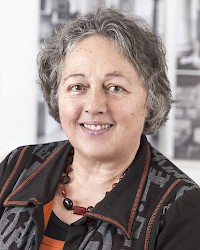Vita
Rosi Braidotti ist eine international renommierte Philosophin und feministische Theoretikerin, Universitätsprofessorin und Gründungsdirektorin des Centre for the Humanities an der Utrecht University. Sie studierte zunächst an der Australian National University und danach an der Université de Paris, Panthéon-Sorbonne, wo sie 1981 bei Luce Irigary promovierte. 1994 war Braidotti Fellow am Institute for Advanced Study, Princeton. 2007 wurde ihr der Ehrendoktortitel der University of Helsinki und 2013 der University of Linkoping verliehen sowie 2005 der Orden vom niederländischen Löwen. Sie ist seit 2009 Honorary Fellow der Australian Academy of the Humanities (FAHA) und seit 2014 Mitglied der Academia Europaea (MAE). Zu ihren zahlreichen Buchveröffentlichungen gehören Patterns of Dissonance (Polity Press, 1991), Nomadic Subjects (Columbia University Press, 1994 und 2011, zweite Auflage), Metamorphoses (Polity Press, 2002), Transpositions (Polity Press, 2006), La philosophie, lá où on ne l’attend pas (Larousse, 2009), Nomadic Theory. The Portable Rosi Braidotti (Columbia University Press, 2011), und The Posthuman (Polity Press, 2013, Posthumanismus, Campus 2014). Seit 2009 ist sie Direktoriumsmitglied des CHCI (Consortium of Humanities Centres and Institutes).
Stand: 2018
Forschungsschwerpunkte
Kontinentale Philosophie
Soziale und politische Theorie
Kulturpolitik
Feministische Theorie
Deleuze
Gender Studies
Ethnicity studies
IKKM Forschungsprojekt
Die Implikationen der posthumanen Wende für die heutigen Geisteswissenschaften
Dieses Projekt beruht auf meiner bisherigen Arbeit in kontinentaler Philosophie und kritischer Theorie und erweitert diese. Es konzentriert sich auf aktuelle Entwicklungen, von der Kritik des Humanismus auf der Basis von nicht-einheitlichen Identitäten oder nomadischen Subjekten bis hin zur Kritik des Anthropozentrismus und des anthropozentrischen Exzeptionalismus. Es zielt darauf ab, die theoretischen Grundlagen dessen, was ich als die „posthumane Wende“ bezeichnet habe, weiter zu erforschen (Braidotti, 2013). Ich möchte insbesondere die Implikationen des posthumanen Dilemmas in epistemologischen und ethischen Begriffen untersuchen, um eine zeitgemäße Reflektion der akademischen Strukturen und des öffentlichen Wertes der Geisteswissenschaften als Ganze vorzunehmen (Braidotti und Gilroy, 2016).
Jüngste Publikationen
Monographien
Per Una Politica Affermativa: Milano: Mimesis/I Volti, 2017.
The Posthuman. Cambridge: Polity Press, 2013. (German trans: Posthumanismus. Campus Verlag, Berlin, 2014)
Herausgeberschaften
(Ed. with Rick Dolphijn) Philosophy After Nature. London and New York: Rowman & Littlefield, 2017.
(Ed. with Paul Gilroy) Conflicting Humanities. London and New York: Bloomsbury, 2016.
(Ed. with Rick Dolphijn) This Deleuzian Century. Leiden: Brill/Rodopi, 2014.
(Ed. with Bolette Blaagaard, Tobijn de Graauw and Eva Midden) Transformations of Religion and the Public Sphere: Postsecular Publics. Hampshire: Palgrave Macmillan, 2014.
Kapitel
“Dymphna und die Figuration der Kriegsheldin”. In Doing Gender in Medien-, Kunst-und Kulturwissenschaften. Ed. Rosemarie Buikema and Kathrin Thiele.Berlin: Lit Verlag, 2017, pp 299-323.
‘A Missing People’. In Former West: Art and the Contemporary after 1989, ed. Maria Hlavajova and Simon Sheikh. London: MIT Press, 2017, 571-580.
“Generative Futures: On Affirmative Ethics”. In Critical and Clinical Posthumanities: Architecture, Robotics, Medicine, Philosophy. Ed. Andrej radman and Heidi Sohn. New Materialisms, ed. Braidotti and van der Tuin. Edinburgh: Edinburgh UP, 2017, pp. 288-308.
“Affitrmative Ethics, Sustainable Futures”. In Utopia/Dystopia: A Paradigm Shift in Art and Architecture. Ed. Pedro Gadanho, with Joao Laia and Susana Ventura. Mousse Publishing, 2017: 157-176.
“Four Theses on Posthuman Feminism”. In Anthropocene Feminism. Ed. Richard Grusin. Center for 21st Century Studies. Minneapolis: U of Minesota P, 2017, pp. 21-48.
“Can the Humanities Become Posthuman? A Conversation”. In Environmental Humanities: Voices from the Anthropocene. Ed. S. Oppermann and S Iovino. London: Rowman & Littlefield, 2017, pp. 339-46.
Artikel
‘Critical Posthuman Knowledges’. In South Atlantic Quarterly, Vol. 116, No. 1, winter 2017, pp. 83-96.
‘Becoming-World Together: On the Crisis of Human’. In Hello Robot: Design Between Human and Machine, ed. Vitra Design Museum, Berlin: Mak, 2017.
‘Editorial: The New Brutality’. With T. Vermeulen et al. e-flux no. 83, June 2017.
“Anthropos Redux: A Defence of Monism in the Anthropocene Epoch”. In Frame – Journal of Literary Studies, Vol. 29, No. 2, winter 2016, pp. 29-48.
‘Don’t Agonize; Organize!’ E-Flux Conversations, 14 November 2016.
“What Does It Mean to Be Posthuman? ” In: Spike Art Quarterly, Vol. 47, spring 2016, pp. 148-150.
‘The Critical Posthumanities; or, Is Medianatures to Naturecultures as Zoe Is to Bios?’ Cultural Politics, ed. Jussi Parikka, vol. 12, no. 3, 2016: 380-90;
‘Die Materie des Posthumanen. Kontexte und Ausblicke des neuen Materialismus’. In: Springerin, Vol. 1, spring 2016, pp. 16-21.
